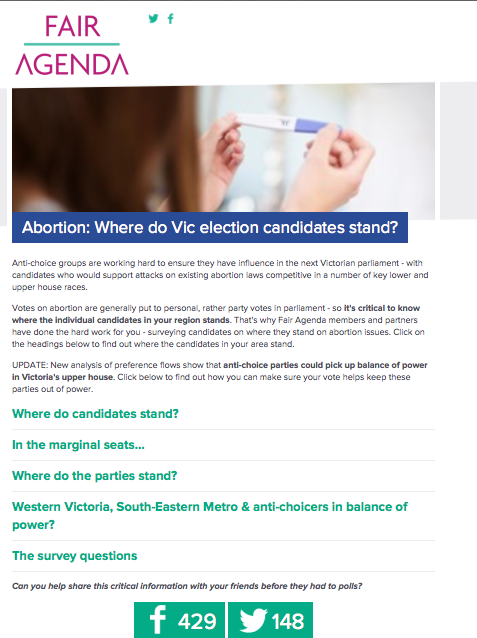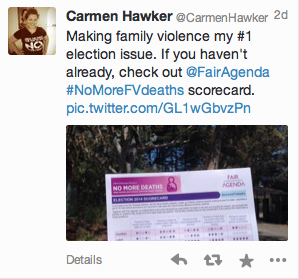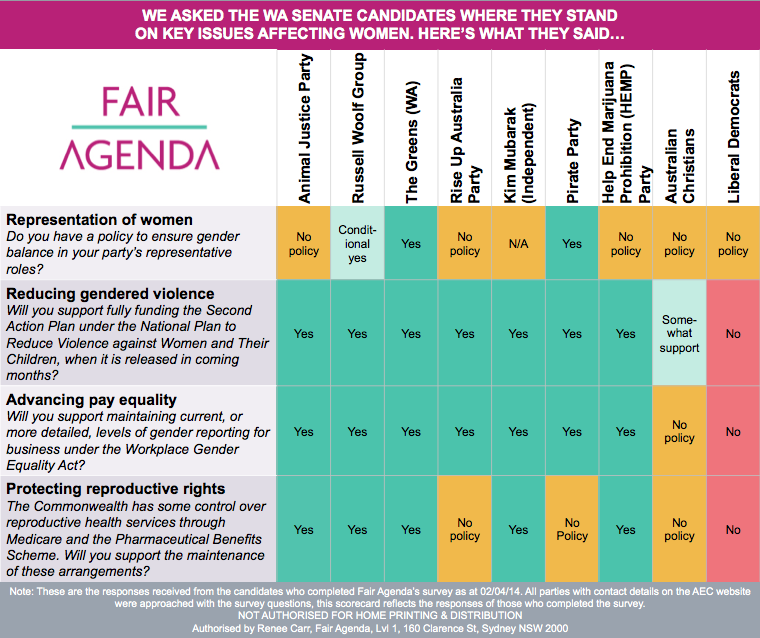Fair Agenda Blog
When Fair Agenda launched earlier this year, we asked members – everyday Australians like you – to tell us which issues you wanted to see on the agenda. Two of the issues that members said were top concerns were family violence and reproductive rights –- that’s why, for the past two months, Fair Agenda members have worked together to keep these issues on the agenda, and to collect the information Victorians need to cast a vote in line with their values.
And together, we’ve had a big impact. Here’s what we were able to achieve in the past eight weeks:
On reproductive rights
 Before the election, polling showed that 85% of Victorian voters support the legal right to choose to have a termination – and that 48% of voters would be likely to shift their vote away from those who attacked abortion laws. It meant shining a light on where candidates stand during the election was going to be powerful.
Before the election, polling showed that 85% of Victorian voters support the legal right to choose to have a termination – and that 48% of voters would be likely to shift their vote away from those who attacked abortion laws. It meant shining a light on where candidates stand during the election was going to be powerful.
That’s why Fair Agenda members and partners came together to ask more than 300 candidates four simple questions about where they stand on critical reproductive rights issues. Together, we collected responses from140 candidates, and got the survey and its results covered in both major Victorian papers - the Herald Sun and The Age.
With support from Fair Agenda members who chipped in to help us buy crucial online advertising space, we were then able to get this critical information about candidate positions in front of thousands of voters in the 3 key marginal raceswhere anti-choice candidates had a chance of winning seats, and to ensure our message was put in front of key Victorian facebook users more than 33,000 times in the week leading up to the election.
On current predictions, none of the anti-choice candidates in these key races were elected to parliament (though a number of key anti-choice parliamentarians and parties were elected in other races for safe and upper house seats); and 44 of the parliamentarians expected to win seats are publicly committed to protecting reproductive rights. It’s an important foundation for the next parliament, and Fair Agenda members were part of the effort that made it possible.
On family violence
 For the past two months, Fair Agenda has worked with the experts at the No More Deaths alliance to demonstrate public support for the changes required to save lives.
For the past two months, Fair Agenda has worked with the experts at the No More Deaths alliance to demonstrate public support for the changes required to save lives.
Fair Agenda worked with the experts to survey and score the parties’ policies on family violence, and in the week before the election Fair Agenda members worked together to get this scorecard in front of more than6,000 voters online.
The scorecard and campaign were also covered by The Age, and ABC News in the week leading up to the election - providing a critical resource for voters like Carmen who wanted to use their vote to support action on family violence this election...
The exact result of Saturday’s vote won’t be known for a few weeks yet – with question marks above key lower house races and Legislative Council seats remaining.
But here’s what we do know about Victoria’s new parliament:
-
It’s expected that women will make up approximately 47% of the Labor caucus. A fantastic step towards equality in our parliaments!1
-
Yesterday Premier Daniel Andrews announced a new Cabinet made up of 9 women and 13 men2 – a significant improvement on the proportion of women appointed to the previous cabinet, and more than 9 times the number of women currently serving in our federal Cabinet.
-
Emma Kealy, Nationals MP has been elected as the member for Lowan – and will be the first woman ever to represent the Wimmera region in state or federal politics.3 Stephanie Ryan MP is also making history as the youngest woman ever elected to represent the Nationals in the Victorian Parliament, and as the new deputy leader of the party. Congratulations to these two history making women!4
-
The government will not have a majority in the Legislative Council – and will need to work with other parties to pass legislation. While seats aren’t confirmed yet, on current projections the parties the Government is expected to have to negotiate with could include: the Greens, Shooters & Fishers, Country Alliance, Democratic Labor Party, Sex Party and Vote 1 Local Jobs party. Of these parties – the Greens and Sex Party have public pro-choice positions; and the DLP have already stated they plan to launch attacks on the Abortion Law Reform Act.
What’s next?
As the new Victorian government get to work, Fair Agenda members will have to keep working together to ensure the issues that matter to us remain on the agenda – including showing key decision makers that the public support the actions experts say are required on family violence, and making sure anti-choice parties aren't able to build momentum for attacks on our reproductive rights.
This was the first major election campaign Fair Agenda members have fought together -- and we’ve still got a long way to go to make sure the issues Fair Agenda members care about stay on the political agenda across the country. But this campaign shows us what's possible when we work together. NSW and Queensland both have state elections in 2015. Together we can make sure that Fair Agenda is heard loud and clear across Australia.
-References-
1. The incoming Victorian State government sure has a lot of women of calibre, SMH, 4 December 2014.
2. Premier-elect Daniel Andrews reveals his cabinet but not their portfolios at caucus meeting, The Age, 3 December 2014.
3. Nationals candidate Emma Kealy wins Lowan and becomes the Wimmera's first female MP, ABC News, 1 December 2014.
4. New Nationals MP Stephanie Ryan breaks the country party's mould, The Age, 3 December 2014.
In any discussion about the lack of women in Cabinet – and the countless other decision-making forums where women remain under-represented – someone will almost always cite “merit” as the reason we don’t see as many women at the table. But the reality is, whatever your politics, it’s hard to argue that the women our Prime Minister would describe as “knocking on the door” are anything short of accomplished and impressive.
As murmurs of impending Cabinet reshuffles continue - can you help us push the conversation beyond "merit" by sharing these articles about women and Cabinet?
-
We’ve been working with our friends at Women’s Agenda to profile some of the women who could be in Cabinet. Click here to read and share the profiles.
Included are Ministers, Assistant Ministers and a Parliamentary Secretary currently serving in the Government – those considered most likely to be promoted into Cabinet. As well as being accomplished politicians, these women have led international delegations to observe presidential elections, worked as commercial pilots and solicitors, run farms, and been appointed a Knight of the Order of Merit of the Italian Republic. -
Click here to read and share yesterday’s Canberra Times piece from Fair Agenda ambassador and peace and security expert Dr Susan Harris-Rimmer calling for more women in Cabinet.
She says: “Diversity is worth pursuing as a democratic value, and to aid better decision-making. Cabinet needs a reshuffle and there does not seem a single good reason why the door should not be opened to more women.”
-
Click here to read and share this piece by Fair Agenda ambassador and leadership & adaptive change expert Liz Skelton about the importance of diversity for good decision making.
She says: “Best practice leadership theory tells us that adaptation and innovation only occur when we can harness diversity of thinking and bring ideas together to create something new."
Can you help spread the word about the importance of ensuring the next cabinet reshuffle includes women? Not just because half the population deserve to be better represented in this key decision making forum; but also because diversity is critical to good decision making, and good democracy.
On reproductive rights
It’s easy to think the fight for reproductive rights is over – but tomorrow Victoria could elect anti-choice candidates to key upper and lower house seats – and set the scene for further attacks on our world-class abortion laws.
Because votes on abortion issues are generally put to personal, rather than party votes – finding out where your local candidates stand on this issue is critical. That’s why Fair Agenda members and partners have done the hard work for you – surveying hundreds of candidates to find out whether they would vote to protect your reproductive rights.
You can find their responses, and critical information on anti-choice parties, at: http://www.fairagenda.org/wheredotheystand
Here's what we know: across the marginal seat races, only 16 of the 57 lead candidates have told Fair Agenda they're committed to voting to protect reproductive rights. And in the upper house, there’s a chance that preference flows could see the DLP and Rise Up Australia - who have clear anti-choice agendas - pick up key seats, and the balance of power, in our next parliament. Make sure your vote won't support attacks on abortion laws - find out where your local candidates stand before you vote: http://www.fairagenda.org/wheredotheystand
On family Violence
Fair Agenda has worked with family violence experts from across the state to find out where the parties stand on the actions the experts say are required to save lives.
You can see the ratings the experts have given to the four parties who responded to our policy survey at: http://www.fairagenda.org/family_violence_scorecard and below:
Can you help share this information with your friends?
Authorised by Renee Carr, Fair Agenda, Level 1, 160 Clarence St, Sydney, NSW 2000
1) Sports Party candidate questioned on inappropriate facebook content
After more than 450 Fair Agenda members took action in our Sports Party campaign, the story got picked up by 6 different news outlets, including: the ABC, Daily Life and Triple J news.
Then, lead candidate Wayne Dropulich was asked in an interview with Radio National to explain why he thought that their actions were appropriate. You can hear the highlights from that interview in this recording, from 16:00.
2) 'Where do the parties stand?' scorecard shared with 2,000 people before the election
Off the back of the Sports Party’s facebook post, Fair Agenda asked representatives from the parties running in the WA election to declare their positions on the key issues that matter most to Fair Agenda members. We asked where they'd stand on specific questions we expect the new Senate will be required to vote on.
Thanks to pressure from Fair Agenda members, we were able to secure responses from 9 of the candidates.
We presented their responses in a scorecard that was shared with more than 2,000 people on Facebook. You can see the scorecard, and the parties’ extended responses, here.

We’ve tallied the results, and are excited to share our members top three priorities for 2014. They are:
1) Representation of women: particularly the presence of women in decision making roles in politics and business, as well as in media and sports coverage.
2) Reducing violence
3) Pay equality: economic inequality and issues affecting women in the workplace were raised across most Agenda Setters, with pay equality coming out as the top priority.
4) Reproductive rights
5) Sexism
Of course, just because an issue isn’t included in this list, doesn’t mean that we won’t campaign on it. Dozens of really important issues were raised across the Agenda Setters. We've reflected on all of these to help get a full picture of what matters to our supporters, and we'll use this information to help us assess and shape our campaigns moving forward.
Our list of member priorities will be used, alongside advice from policy experts, to shape where we focus our campaign resources in 2014.
Thanks so much for sharing your priorities with us. We can't wait to start campaigning on these important issues!




